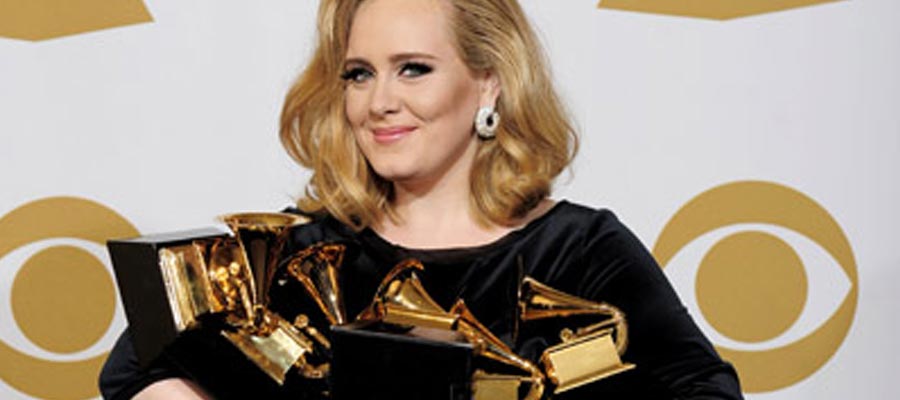Kanye West received the most nominations with seven. Adele, Foo Fighters, and Bruno Mars each received six nominations. Lil Wayne, Skrillex, and Radiohead all earned five nominations. Paul McCartney received the Musi Cares Person of the Year award on February 10, 2012, at the Los Angeles Convention Center, two nights prior to the Grammy telecast.
The night before the awards, Whitney Houston died in Los Angeles, and show producers quickly planned a tribute. Adele won all of her six nominations, tying Beyoncé’s record for most wins by a female artist in one night. Foo Fighters and Kanye West followed with five and four awards, respectively. The 54th Grammys were the second-highest rated in its history with 39.9 million viewers. The rating was 50% higher than in 2011.
A glowing Adele did not disappoint, nor was she disappointed. She won six Grammys, including the Big Three: song and record of the year for “Rolling in the Deep,” and album of the year for “21.” Earlier in the night, she thanked “the doctors who brought my voice back.” She described her winning album “21” as being about something “everyone’s been through … which is a rubbish relationship.” The album was the year’s biggest-selling and now most-acclaimed recording.
Houston’s death in a Los Angeles hotel room Saturday put the Grammys into scramble mode, as they altered the telecast schedule and devised an appropriate tribute to the pop icon. “We’ve had a death in our family,” host LL Cool J said. He offered “a prayer for a woman we loved, for a fallen sister.”
Jennifer Hudson performed a stark version of the Dolly Parton song that Houston made her own, “I Will Always Love You,” on “The Bodyguard” soundtrack. Hudson, one of countless singers influenced by Houston’s pop-gospel sound, pushed her voice hard in the final turn, the slight cracking exposing the intensity of her emotion. “There’s a little bit of a dark cloud … a lot of people are heartbroken,” country singer Miranda Lambert said before the telecast. But “we can let music heal us.”
Bruce Springsteen came not to heal but to incite. He kicked open the telecast with a song that rocked the building, brought a clapping Paul McCartney out of his seat and expressed no small measure of discontent in a US election year. “Where’s the promise from sea to shining sea?” Springsteen sang on “We Take Care of Our Own,” from his forthcoming album.
February a big month for AwardsThe Academy Award voters awarded Best Picture to „The Artist,“ the first silent film to triumph on Hollywood’s biggest night since the original Oscar ceremony 83 years ago. The black-and-white film picked up five awards in all, including best picture, actor for Jean Dujardin and directing for Michel Hazanavicius. The other top Oscars went to Meryl Streep as best actress for „The Iron Lady,“ Octavia Spencer as supporting actress for „The Help“ and Christopher Plummer as supporting actor for „Beginners.“
Streep’s win was her first Oscar in 29 years, since she won best actress for „Sophie’s Choice.“ She had lost 13 times in a row since then. Streep also won a supporting-actress Oscar for 1979’s „Kramer vs. Kramer,“ and has earned a total of 17 nominations. “Iron Lady” is a biopic of Margaret Thatcher, the still controversial former Conservative Prime Minister of the UK. Streep’s win puts her in a category with other three-time Oscar winners Jack Nicholson, Walter Brennan and Ingrid Bergman. Only Katharine Hepburn – with four wins – had more.
Dujardin became the first Frenchman to win an acting Oscar. French actresses have won before, including Marion Cotillard and Juliette Binoche. „Oh, thank you. Oui. I love your country!“ said Dujardin, who plays George Valentin, a silent-film star who falls on hard times when talking films take over. If Valentin could speak, Dujardin added, „he’d say … ‚Merci beaucoup, formidable!“‚
Martin Scorsese’s Paris adventure „Hugo“, which led contenders with 11 nominations, won five Oscars, including the first two prizes of the night, for cinematography and art direction. It also won for visual effects, sound mixing and sound editing.
The visual-effects prize had been the last chance for the „Harry Potter“ franchise to win an Oscar. The finale, „Harry Potter and the Deathly Hallows: Part 2,“ had been nominated for visual effects and two other Oscars but lost all three. Previous „Harry Potter“ installments had lost on all nine of their nominations.
While „The Boy Who Lived“ didn’t strike Oscar gold, another beloved big-screen bunch, the Muppets, finally got their due. „The Muppets“ earned the best-song award for „Man or Muppet,“ the sweet comic duet sung by Jason Segel and his Muppet brother in the film, the first big-screen adventure in 12 years for Kermit the frog and company.
Filmmaker Alexander Payne picked up his second writing Oscar, sharing the adapted-screenplay prize for the Hawaiian family drama „The Descendants“ with co-writers Nat Faxon and Jim Rash. Payne, who also directed „The Descendants,“ previously won the same award for „Sideways.“
Woody Allen earned his first Oscar in 25 years, winning for original screenplay for the romantic fantasy „Midnight in Paris,“ his biggest hit in decades. It’s the fourth Oscar for Allen, who won for directing and screenplay on his 1977 best-picture winner „Annie Hall“ and for screenplay on 1986’s „Hannah and Her Sisters.“
„Rango,“ with Johnny Depp providing the voice of a desert lizard that becomes a hero to a parched Western town, won for best animated feature, while Iran’s „A Separation“ won for foreign language film. „Undefeated,“ a portrait of an underdog high school football team, won for documentary feature.
Debbie Gambrill
foto zdroj: TASR/AP

